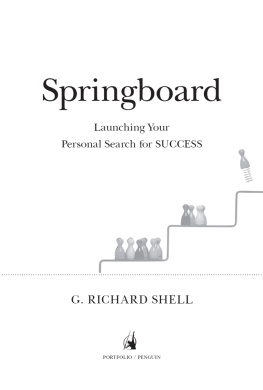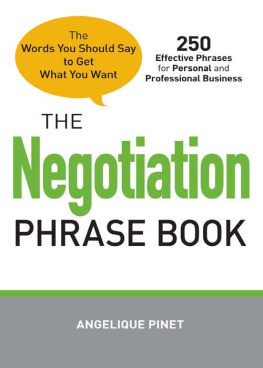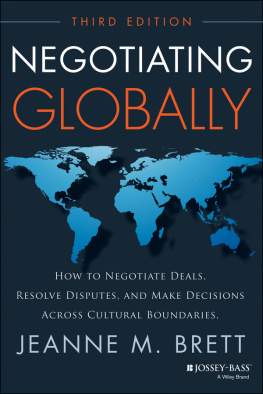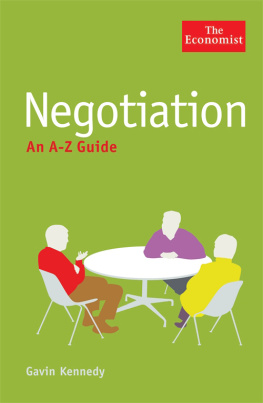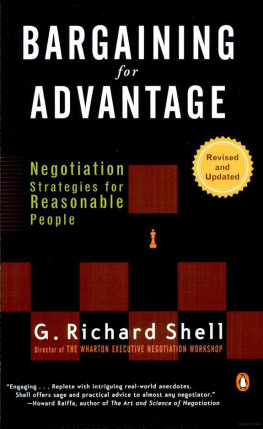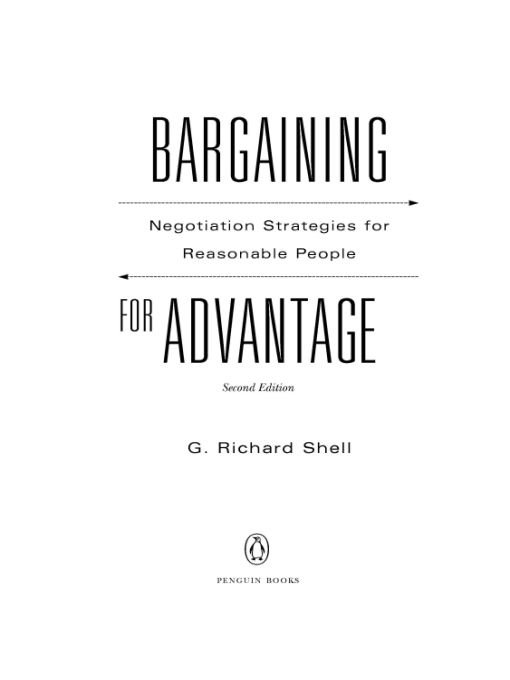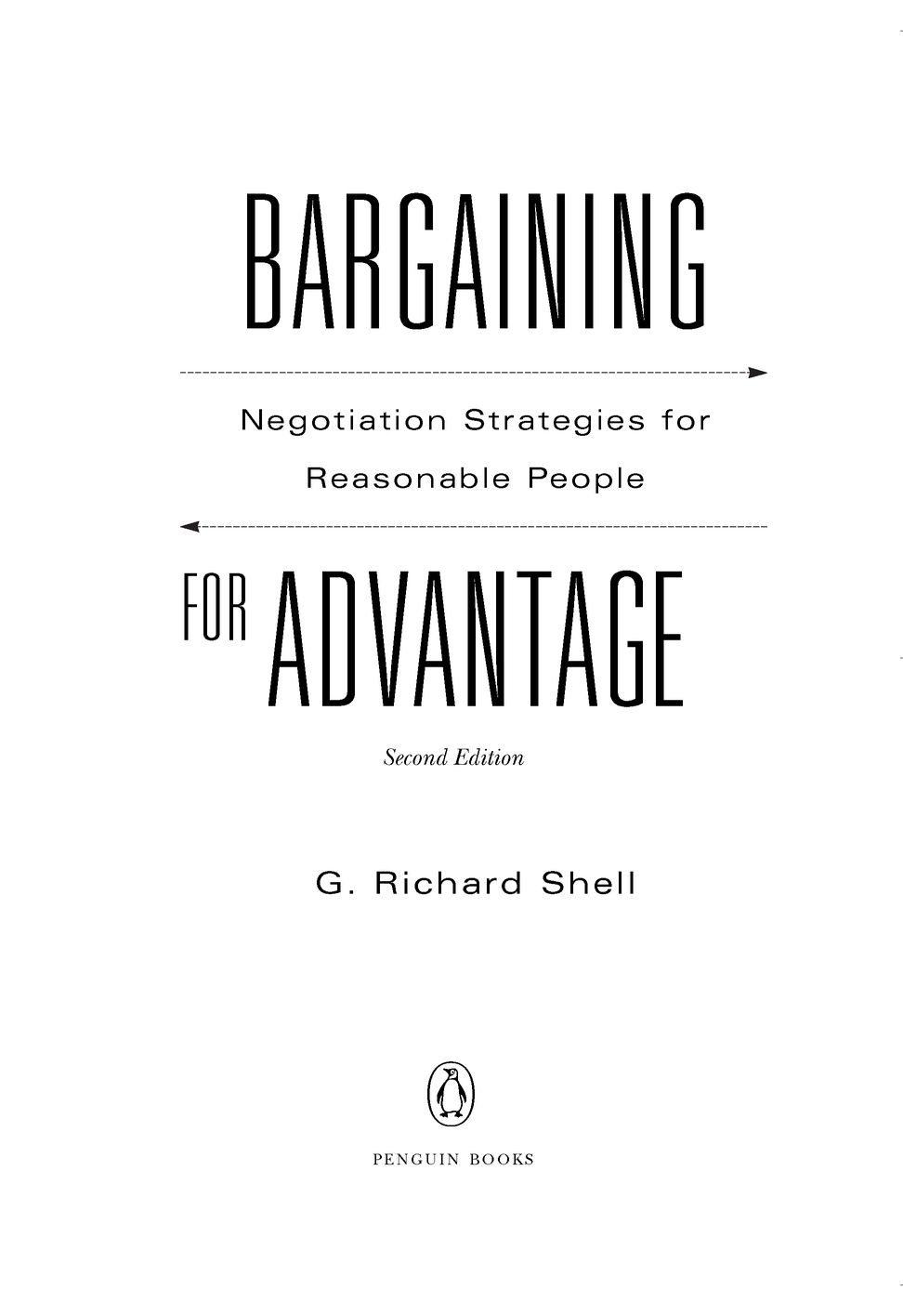Table of Contents
Praise for Bargaining for Advantage
Readers interested in developing or refining their negotiation skills should run, not walk, to the nearest bookstore for a copy of Bargaining for Advantage.... It belongs on any list of required reading for practitioners or educators in the field of negotiation and is also highly recommended to the general public.
Alternative Dispute Resolution Report
Not only is Professor Shells book one that no business man or woman should overlook, it is also very readable and enjoyable ... regardless of what business youre in, this is one of those invaluable tools to make use of over and over again.
The Update
Whether youre buying a car, trying to get the kids into bed, or brokering a major business deal, Bargaining for Advantage teaches you to think on your feet and discover imaginative ways to come to terms with anyone.
Laurie Calkhoven, editorial director, The Money Book Club
Articulate, well-researched and tightly organized.... A smart, readable, helpful and nicely different take on negotiations.
The Pennsylvania Gazette
A new book that could really shift your sensibilities about the art of negotiationtaking out the mystery and replacing it with a success toolbox ... A volume that gives direct and practical fundamentals to becoming an effective bargainer in any situation.
Business Digest
When it comes to negotiation, Richard Shell at Wharton is the best. His book and workshop show how to play the game without giving up your self-respect or threatening the other partys self-esteem. Bargaining for Advantage is a must for everyone who wants to feel more comfortable and effective at the bargaining table.
Max J. Garelick, president and CEO, Perry Ellis International
Packed with well-selected examples of negotiating strategies from the business world and fascinating cultural observations, Bargaining for Advantage details every aspect of the fine art of negotiating. Should be required reading for anyone who is about to make a deal.
Ann McLaughlin, chairman, The Aspen Institute
Wise, persuasive, and entirely readable, Bargaining for Advantage provides practical step-by-step advice for negotiators who want to bargain effectively without compromising themselves or their values. Michael Wheeler, Harvard Business School, coeditor of The
Negotiation Journal
Tightly written, entertaining, and smart, Richard Shells Bargaining for Advantage is a must read for anyone seeking greater insight into the art and science of negotiation.
Judith Rodin, president, University of Pennsylvania, professor of psychology, psychiatry, and medicine
Richard Shells book is the first step toward going into a negotiation with confidence. His logical and specific advice is extremely helpful for any businesswoman trying to succeed in a negotiation with both skill and grace.
Hilary B. Rosen, president and CEO, Recording Industry Association of America
Bargaining for Advantage delivers just the sort of real world tools we are constantly looking for at Compaq to help our managers negotiate and form alliances more effectively. Research-based but highly accessible, Richard Shells work will become a cornerstone in our negotiation training efforts.
Myles A. Owens, director, Strategic Alliances and Partnership, Compaq Computer Corporation
Richard Shell is known to be a star teacher of negotiation. His expertise comes through in this book ... a wonderful integration of practical advice that will be useful to all readers.
Max H. Bazerman, Gerber professor of dispute resolution and organization, Kellogg School of Management at Northwestern University
Shells insights as a scholar, and his years of experience as a negotiation teacher at one of the worlds leading business schools, come together on every page of this very readable book. The writing is clear; the ideas are sound; and the narrative is crisp and compelling. The book is rich in cogent observations and vivid examples that help connect academic bargaining concepts to the real-world arenas in which they play out.
Stanford University Professor Roderick M. Kramer in The Negotiation Journal
PENGUIN BOOKS
BARGAINING FOR ADVANTAGE
G. Richard Shell is the Thomas Gerrity Professor at the Wharton School of the University of Pennsylvania, where he is academic director of the Wharton Executive Negotiation Workshop. BusinessWeeks biannual Guide to the Best Business Schools named him three times as one of the nations top business school professors. He consults widely and trains business executives, nonprofit leaders, and government officials from all over the world to be more effective negotiators. He lives with his wife and two sons near Philadelphia in Wynnewood, Pennsylvania.
For Robbie, Ben, and Ned,
who have taught me so much.
Preface to the Second Edition
It is with real pleasure that I offer this second edition of Bargaining for Advantage. I wrote this book in the late 1990s because I was dissatisfied with the existing set of works for serious students and practitioners of this fascinating process we call negotiation. I wanted a book that would explore the immense variety of real-world negotiations, provide both historical context and a social science foundation for dealmaking, and be fun to read. The appearance of this new edition and the many foreign translations of this work (more than ten at last count) suggest the book hit its mark.
So why improve on something that works? Four reasons. First and foremost, a new edition gives me a chance to share with readers a new Bargaining Styles Assessment Tool, which can be found in Appendix A. I believe that many negotiators have distinctive talents, strengths, and weaknesses rooted in personality. These traits are not set in concrete, but they generate biases and preferences that strongly affect how they behave at the bargaining table. I designed this bargaining styles assessment instrument to probe such negotiation instincts. By including my new test here, along with a standardized grid for evaluating your results in comparison with those of more than 1,500 executives from all over the world, I hope readers can come away from the book with a deeper understanding of the kind of negotiator they are when they are at their best.
The second reason for a new edition has to do with advancing communication technology. At the time I was writing Bargaining for Advantage, the world had not yet become as dependent as it is now on Internet-enabled electronic communication systems such as e-mail and instant messaging. This second edition gives me a chance to directly address the perils and promise of electronic negotiations, which I do in Chapter 7. This same chapter also features a new section on using agents in the bargaining process, an important topic I neglected earlier.
Third, I have become more aware since publishing the first edition of the importance of gender and culture as negotiation variables. I therefore address these topics in Chapter 1 in more detail than before. The publication in 2003 of Linda Babcocks and Sara Laschevers



